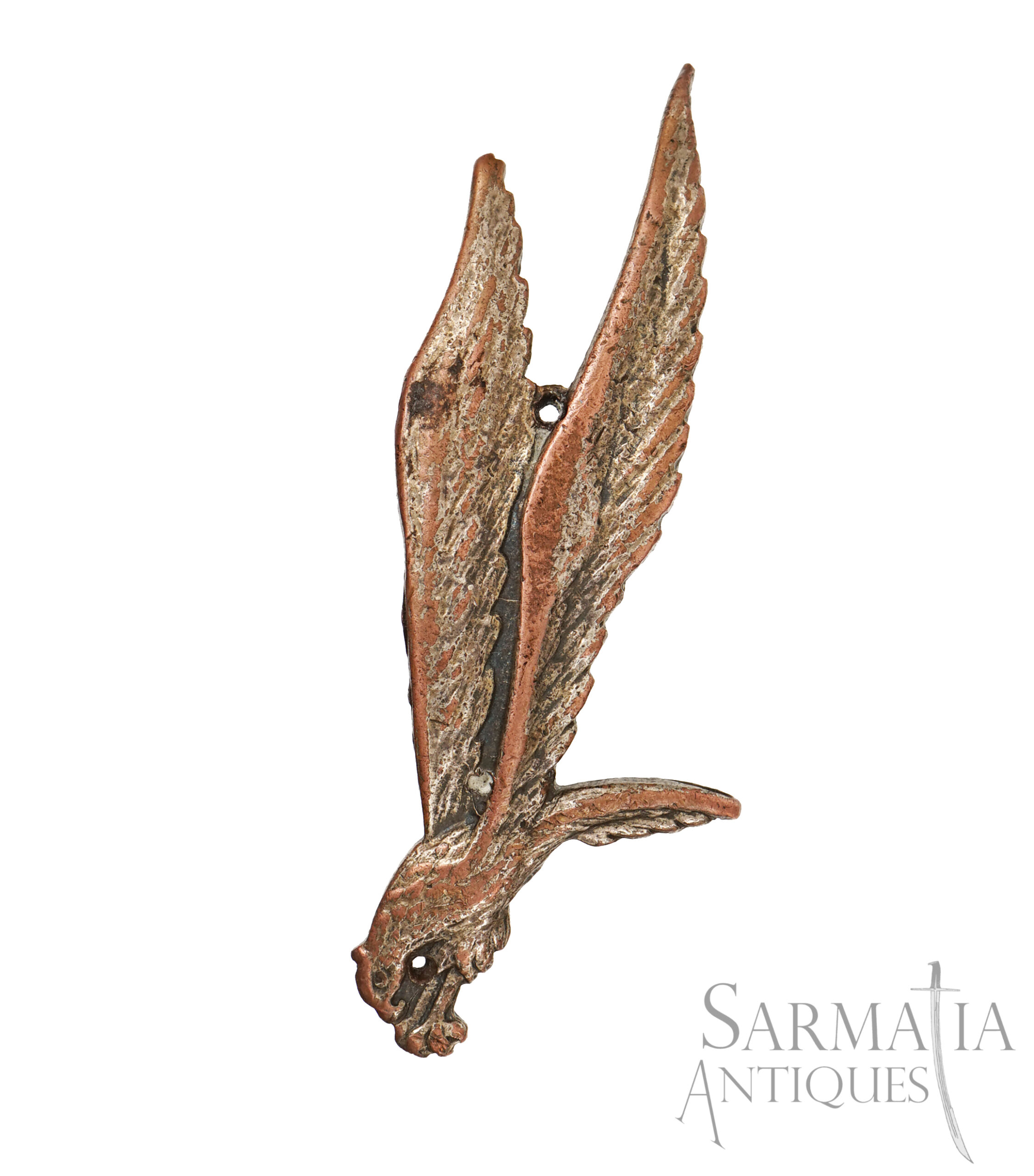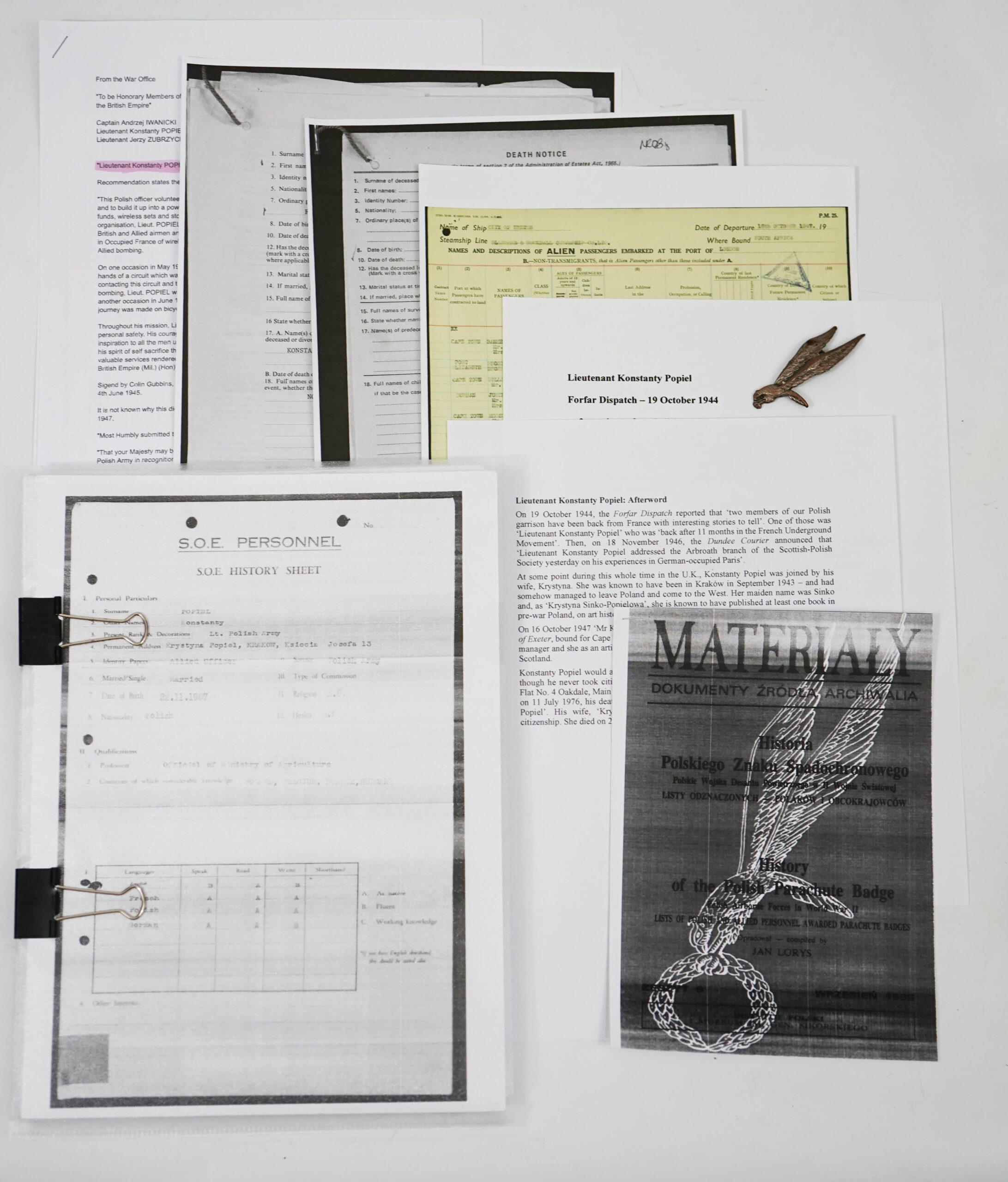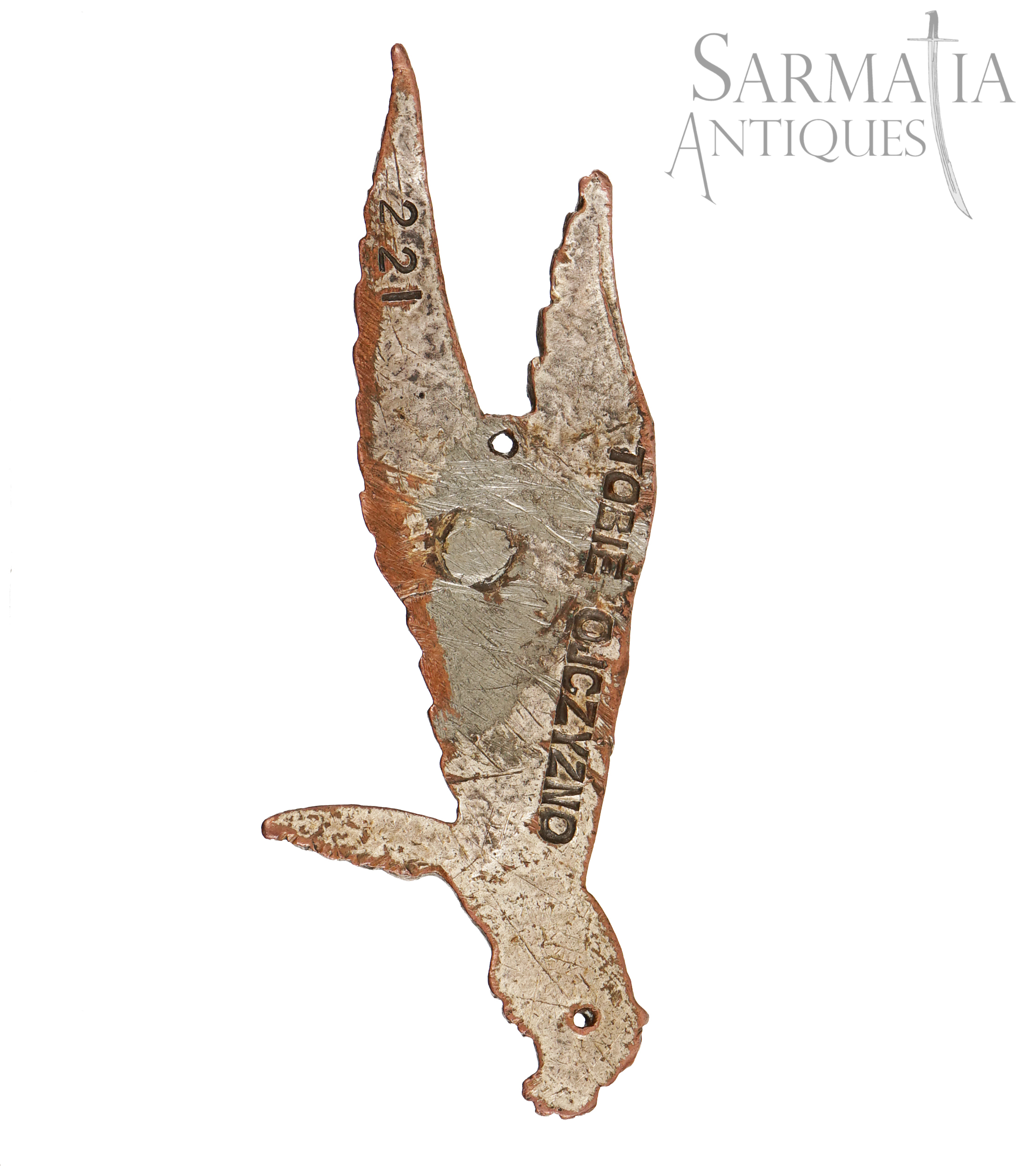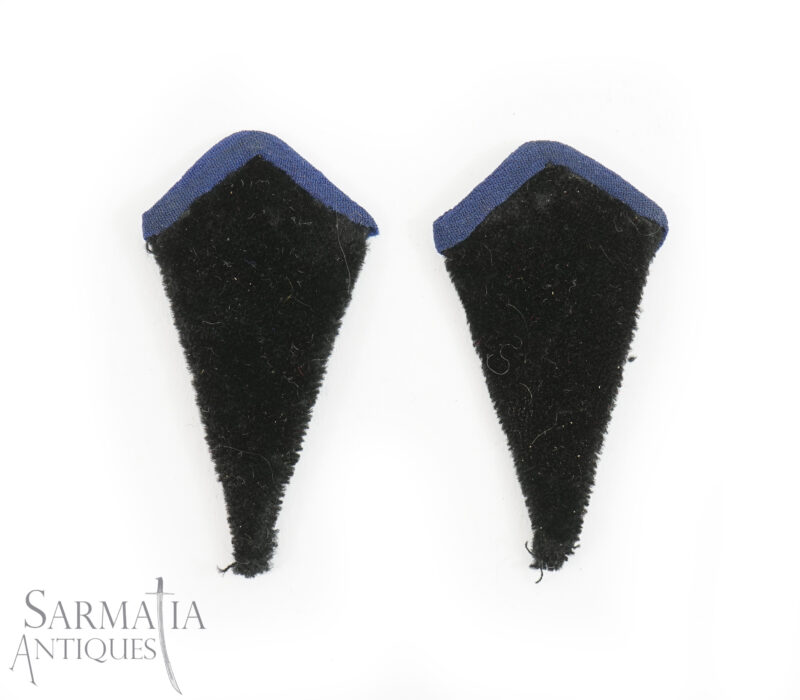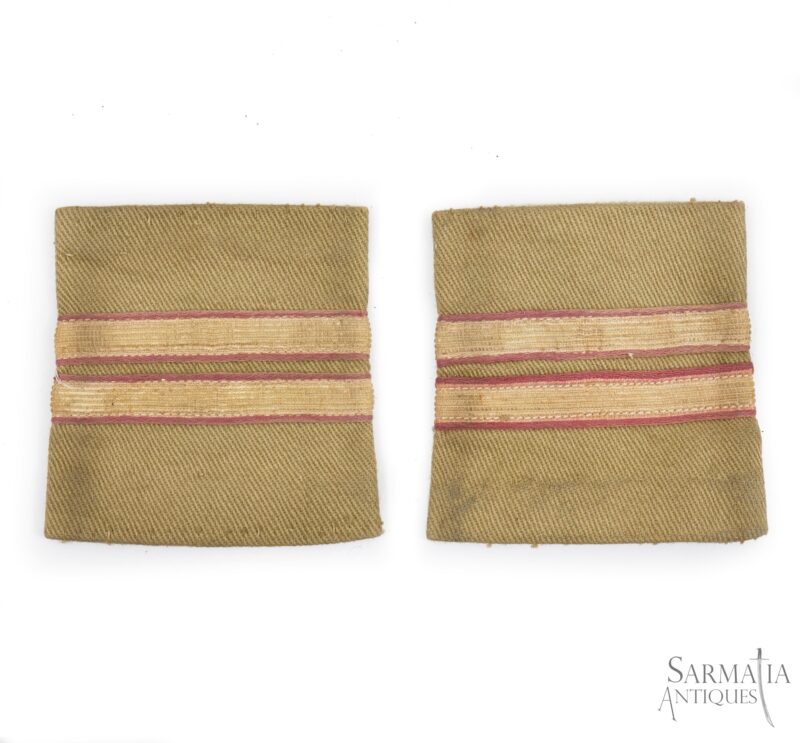
WW2 Polish Badge – Infantry & Motorised Cavalry Officer Cadet School – Scotland
May 25, 2023
pre-WW2 Polish Badge of the Lithuanian-Belarusian Division – Number 307/19375
June 1, 2023WW2 Polish Parachute Badge to Ltn. Popiel MBE, Polish VIth Bureau & Special Operations Executive (SOE) Agent ‘Loyola’
Price on Request – Please send an email or call
Polish Parachute Badge given to Lieutenant Konstanty Popiel MBE, agent pseudonym “Loyola” of the Polish VI Bureau of the Commander-in-Chief and the British Special Operations Command (SOE) operating from December 1943 in occupied France for 11 months.
Badge in the form of a spiking eagle.Smooth reverse, impressed inscription “Tobie Ojczyzno” – “For you Fatherland” and the number 221, the number given to Lieutenant Konstanty Popiel. Trace of the removed post and two holes drilled to sew the badge to the uniform. Silver-plated tombak, silvering worn in many places. Para wings 1-500 were designated for the graduates of the “O” Course of the Section VI of Polish General Staff, the Cichociemny (Silent Unseen) agents.
The sign is offered together with scans of a file from the British National Archive, containing all the data from the British intelligence on the operation of the agent Konstanty Popiel pseud. “Loyola”. The agemt is not known in Polish literature because his personal file and data were kept secret until 2009. Along with the set are other scans of documents found during the research. Below is the biography of the unknown hero, researcjed by us.
Biography Summary:
Konstanty Popiel joined the Polish Section of the Special Operations Executive (SOE) on 1 June 1943, having been recruited by S/Ldr Archibald. By 9 August of that year, he was noted to be an organiser in the Clandestine Communications Section of SOE.
On 9 October 1943 his mission was codenamed Operation ‘Clutch’ and his false French cover identity had been fully documented in the surname of ‘Fouque’. On the night of 31 November-1 December 1943, and along with a few other agents, Konstanty Popiel was taken by boat across the English Channel and landed on the northern coast of Brittany at the Pointe de St. Cast, west of St. Malo. Having eventually reached Rennes, he and two others took the train for Paris, where he was to be mainly based throughout his time in occupied France as Agent ‘Loyola’.
This Polish officer volunteered to go to France at the end of 1943 to take over the nucleus of an organisation and to build it up into a powerful circuit capable of exfiltrating Allied airmen and British agents and delivering funds, wireless sets and stores. In spite of many difficulties and dangers due to the moribund condition of the organisation, Lieut. Popiel succeeded so well in his mission that his organisation exfiltrated without loss all British and Allied airmen and agents entrusted to him. In addition, his circuit undertook successfully the delivery in Occupied France of wireless sets, stores and funds at a time when railway transport was disorganised through Allied bombing.
On one occasion in May 1944, Lieut. Popiel was instructed to exfiltrate two important couriers who were in the hands of a circuit which was considered to have been penetrated by Gestapo. Despite the risk involved in contacting this circuit and the difficulties of transporting the men down to the Spanish frontier under heavy Allied bombing, Lieut. Popiel was successful in his task and two lives valuable to the Allied Cause were saved. On another occasion in June 1944, Lieut. Popiel himself brought out an Allied airman from Orleans; the whole journey was made on bicycles as there were then no trains running to the south.
Originally, it had been intended for Popiel to be taken to France as part of the ‘Szumowski organisation’, which was described in his interrogation report dated 29.9.44 as ‘the Military Section representing the Polish Resistance Movement in France [i.e. Polska Organizacja Walki o Niepodległość], the Chief of which in London was Lt. Col. Szumowski’. However, by the time he reached France it had been agreed that, while he would liaise with the POWN and the VIth Bureau, the only channel of communication would be between him and SOE HQ in London.
Lieutenant Popiel returned in the UK on 24 September 1944. On arrival was instructed to report to either S/Ldr Archibald or Capt.Whitaker. Konstanty Popiel was recommended for an MBE by D/F Section of SOE in May 1945. However, although this passed through various stages up to 7 June, it did not go any further forward. The recommendation was re-submitted on 10 March 1947 and, having been approved, was announced on 30 September 1947. The MBE was returned by Popiel as a sign of protest when the Labour Govt awarded the MBE to the Beatles in 1965.
As the Polish Government in Exile was no longer recognised and his homeland was occupied by a puppe Soviet Communist government, Konstanty Popiel moved to South Africa in 1947 where he passed away in 1976.
———–
Full Biography:
Konstanty Popiel was born on 22 November 1907. Very little is known about his personal life before 1939, apart from the fact that his wife was called Krystyna and that he had a sister, Pia Popiel.
During the war, his profession was described as ‘official of the [Polish] Ministry of Agriculture’ and he was noted to have ‘considerable knowledge of Poland, Belgium, France and Hungary’. His foreign-language skills were impressive too: his spoken and written French, as well as his ability to read that language, were all ‘as native’; likewise his spoken, and ability to read, German – while his English reading was ‘as native’ and his spoken and written English were ‘fluent’.
It would seem reasonable to assume that, before the war, Popiel was a reserve officer in the Polish Army, although his military status during the first year or so of the war is unclear. It is highly possible that already then Popiel was a Polish Intelligence. On 27 August 1943, it was reported that at some point he had been ‘invalided from the Polish Army as a result of an operation for a double hernia’. It was also noted on 29 April 1944 that, before his time with the SOE, ‘he was attached to the HQ Staff [in London] of the VIth Bureau (i.e. Oddział VI); he is of the educated officer type and has a high sense of discipline’.
Konstanty Popiel joined the Polish Section of the Special Operations Executive (SOE) on 1 June 1943, having been recruited by S/Ldr Archibald. On 12 October that year he was formally ‘handed over to SOE, on which organisation he will henceforward depend’ and was no longer the responsibility of the VIth Bureau.
In a meeting held on 5 August 1943 he stated that he was ‘quite willing and considers himself physically fit to jump by parachute, though he has not as yet had any training’. By 9 August of that year, he was noted to be an organiser in the Clandestine Communications Section of SOE. In that same month, having complained about the state of his health, he was found to have ‘some irritation of the duodenum’ and later received a diagnosis of chronic cholecystitis. However, on balance, it was decided that he should still be given the chance to train as an agent and, on 20 September, it was ‘agreed that Popiel’s condition need not prevent him from going into the Field in a conspiratorial capacity’.
As a ‘student’ at various Special Training Schools, he completed the following courses:
- Finishing Course (STS No. 37b) 30.6.43 to 22.7.43
- Parachute Course (STS No. 51) 23.8.43 to 27.8.43 ‘4 drops 1st class’
- Special Training / Special Codes Revision (STS No. 32a) 8.9.43 to 12.9.43
- Holding Training (STS No. 42) 14.9.43 to 2.10.43
- Holding Training (STS No. 42) 26.10.43 to c. 9.11.43
In addition, Lt Popiel received Lysander Training from 29.8.43 to 3.9.43 with No. 161 Squadron at Tempsford, during which time he clocked up approx. 7 hours’ flying time. He then took part in a Lysander Mail Pick-up Course, 5-6.9.43. In the meantime, his cover story in France was being concocted. Among many other details, this involved him being in the Belgian Congo and returning to Marseilles from Lobito, in present-day Angola, around the end of June or the beginning of July 1940. On 26 September 1943 an SOE officer noted that ‘Popiel has asked me to send the VI Bureau a copy of the report on his sewing [i.e. parachute] training at Station 51’. This would have confirmed his successful completion of the course at Ringway, with the aim of claiming his entitlement to the Parachute Insignia.
On 9 October 1943 his mission was codenamed Operation ‘Clutch’ and his false French cover identity had been fully documented in the surname of ‘Fouque’. His salary with SOE was recorded as £400 per annum ‘while in the field’. He was scheduled to leave for France on 15 October, though this operation was then ‘postponed, not cancelled’ and it was hoped to ‘take place during the November moon period’. However, this was also postponed ‘owing to weather conditions etc.’
Finally, on the night of 31 November-1 December 1943, and along with a few other agents, Konstanty Popiel was taken by boat across the English Channel and landed on the northern coast of Brittany at the Pointe de St. Cast, west of St. Malo. Having eventually reached Rennes, he and two others took the train for Paris, where he was to be mainly based throughout his time in occupied France as Agent ‘Loyola’.
The clandestine work carried out by him is well described in the recommendation for his award of the MBE:
This Polish officer volunteered to go to France at the end of 1943 to take over the nucleus of an organisation and to build it up into a powerful circuit capable of exfiltrating Allied airmen and British agents and delivering funds, wireless sets and stores. In spite of many difficulties and dangers due to the moribund condition of the organisation, Lieut. Popiel succeeded so well in his mission that his organisation exfiltrated without loss all British and Allied airmen and agents entrusted to him. In addition, his circuit undertook successfully the delivery in Occupied France of wireless sets, stores and funds at a time when railway transport was disorganised through Allied bombing.
On one occasion in May 1944, Lieut. Popiel was instructed to exfiltrate two important couriers who were in the hands of a circuit which was considered to have been penetrated by Gestapo. Despite the risk involved in contacting this circuit and the difficulties of transporting the men down to the Spanish frontier under heavy Allied bombing, Lieut. Popiel was successful in his task and two lives valuable to the Allied Cause were saved. On another occasion in June 1944, Lieut. Popiel himself brought out an Allied airman from Orleans; the whole journey was made on bicycles as there were then no trains running to the south.
Throughout his mission, Lieut. Popiel showed a remarkable devotion to duty and a total disregard of his personal safety. His courage and determination in the face of almost insurmountable difficulties were an inspiration to all the men under his command, and it is undoubtedly due to his hard work, despite ill health, and his spirit of self-sacrifice that his organisation was so outstandingly successful. In recognition, therefore, of the valuable services rendered by this officer, it is recommended that he be appointed a Member of the Order of the British Empire (Mil.) (Hon.).
Originally, it had been intended for Popiel to be taken to France as part of the ‘Szumowski organisation’, which was described in his interrogation report dated 29.9.44 as ‘the Military Section representing the Polish Resistance Movement in France [i.e. Polska Organizacja Walki o Niepodległość], the Chief of which in London was Lt. Col. Szumowski’. However, by the time he reached France it had been agreed that, while he would liaise with the POWN and the VIth Bureau, the only channel of communication would be between him and SOE HQ in London. Therefore, there was much disapproval expressed by SOE in April 1944, when it was discovered that ‘Szumowski’s people’ in France had contacted Popiel directly in January 1944.
While in France, a postcard for him arrived in London, which had been delivered via Lisbon. This had been sent from Kraków by his wife, Krystyna. It was dated 29.9.43 and gave her address as Krakau Bielitzer Str. (Ks. Józefa) 13. An SOE note of 3 January 1944 requested the following to be carried out:
‘Could you arrange for the message to be conveyed to him in some way, please? As you will realise, it will be of the greatest personal importance to him, as in all probability it is the first news of his wife for some considerable period.’ (The contents of this postcard were then translated and the gist of her message was sent on to Popiel.)
Moreover, during his time in France, he certainly did not forget his sister, Miss Pia Popiel – as a note from SOE, dated 1 May 1944, explained:
‘I enclose herewith a parcel for censor containing two pairs of silk stockings and a bottle of scent addressed to our agent Popiel’s sister. These articles were brought out of France by our agent Dent. If there is no objection to its despatch, would you please forward the parcel to her with the accompanying note.’ (The parcel was duly censored and passed on to Pia Popiel.)
On 29 April 1944 it was suggested that Popiel be brought back to the UK ‘for consultations and further briefing’ before returning to France, although this did not come about. As a result, he continued to carry out his mission up to and beyond the liberation of Paris in August 1944. On 5 September he and another agent, both of whom from ‘D/F Section’, were noted to be in Paris, where Lt. Col. Humphreys was due to visit them ‘in about ten days’. A request was then put in that, ‘owing to the state of their health, they should be spared all formalities [on arrival in the UK]. They have done most valuable work for us in the field over a long period.’
Both agents left Paris ‘by air’ and landed in the UK on 24 September 1944. On arrival, Konstanty Popiel was instructed to report to either S/Ldr Archibald or Capt. Whitaker at 36 Devonshire Mews West. Thereafter, on 27 September, the following instruction was made by SOE: ‘Please inform Loyola’s sister in the Kensal Legation that her brother has safely returned to this country’. In October 1944, SOE settled Popiel’s bank account, crediting him with £300 for the ‘period in the field 2.12.43 to 1.9.44’. Back in April 1944, the SOE accounts department discovered that Konstanty Popiel had received ‘parachute pay’ twice – from the Polish as well as the British authorities. This was when the sum of £6.10s. was taken from his account, in order to recover the latter payment.
By October 1944 Popiel was a patient in Shenley Military Hospital near St. Albans. On 30 October, he wrote to Capt Dolton in SOE to say that he was feeling better but was fed up and ‘should be very glad to do some useful work soon again’. The reply he received was sympathetic: ‘I understand how you feel in regard to your present inactivity and we will talk about this when I see you’. At that time, it was confirmed that Popiel was suffering from a duodenal ulcer as well as renal pain, though no stones were detected.
On 7 December 1944 Lt. Col. Humphreys wrote to Col. Utnik of the VIth Bureau, with regard to Lt. K. Popiel:
‘The above-named officer [has] returned to the UK having successfully completed the mission assigned to him. We wish to place it on record that whilst in the field he carried out his duties to our complete satisfaction; at all times he showed courage and devotion to duty of the highest order. His mission having terminated we suggest that he be returned to you, and would like to thank you for having placed this officer at our disposal. We have therefore instructed him to report to you on the 15th December, and he will be paid and accommodated by our organisation up to and including 14th December 1944.’
It is highly likely that he received his badge for qualifying as a parachutist at this point, following his return to the VIth Bureau. This badge, Parachute Insignia No. ‘221’, was among a batch that had been supplied to the VIth Bureau around August 1944.
Konstanty Popiel was recommended for an MBE by D/F Section of SOE in May 1945. However, although this passed through various stages up to 7 June, it did not go any further forward. The recommendation was re-submitted on 10 March 1947 and, having been approved, was announced on 30 September 1947. Although better than nothing, it was scant reward when set against all he had achieved and everything he had gone through.
The last letter in Popiel’s SOE file was written by him on 1 September 1946 from Redden Camp near Brechin in Scotland. It was addressed to Col. Humphreys, in the hope that he might be able to find his former SOE agent some sort of position, somewhere. In this letter, Popiel complained that another 3½ years would have to elapse before he could become a naturalised British citizen. He had not been successful in finding employment in France and, in the meantime, had ‘joined a forestry course in Scotland, organized within the framework of the civil resettlement of the Polish Forces’. In reply, he was informed that Col. Humphreys had ‘now left the service and gone overseas’ – meaning that his plea for assistance came to nothing.
The latest mention of him in his SOE file is contained in a note written onto the recommendation for his MBE:
‘Awarded on 30 Sept 1947, but returned it as a sign of protest when the Labour Govt awarded the MBE to the Beatles.’ [in 1965]
Various SOE Reports on Konstanty Popiel
Finishing Course (STS No. 37b), dated 22 July 1944: ‘He is very intelligent, quick and quite practical. He worked hard and was obviously very enthusiastic. He was a most painstaking interpreter. He has a lively imagination and plenty of initiative. In character, he is steady, sincere and thoughtful. He is somewhat lacking in sense of humour. Although he has a rather quiet personality, he is a good mixer and seems to get on well with everyone. As a leader he should be well able to look after a small group.’
Lysander Training, dated 10 September 1943: ‘Lt Popiel fell sick on the second day of the course, but although obviously in pain, insisted on completing it. He worked well and should prove a good operator.’ (This course involved Lysander and Hudson aircraft and also covered flare paths).
Special Training / Special Codes Revision (STS No. 32a), dated 14 September 1943: ‘High standard of intelligence, with good common sense. Quick thinking and logical. Capable and determined. Has considerable charm and is a good talker. Is particularly suited for contacting people. Codes Report: He was revising work learnt during a previous course and showed immediately that he understood everything and remembered all the details. Has arranged Innocent Letter conventions (Playfair) and is capable of using this or the Double Transposition System.’
Holding Training (STS No. 42), dated 23 October 1943: ‘He came here with a view to practising his French and had no specific programme of training. This student was thoroughly popular with all the students at this school. He has a charming personality, and gave the impression of being highly intelligent and conscientious. He did a great deal of private work while he was here, participated in some of the training, and generally shared the life of the school. He is obviously a very good man in so far as his general character and morale is concerned. He gave much useful help in instructing in codes. He speaks fluent French with an almost imperceptible Polish accent.’
Holding Training (STS No. 42), dated 11 November 1943: ‘This student reported to this school for the second time… He practised his French, underwent revisionary training in subjects suitable to his role, and generally participated in the life of the school. Demolitions: This subject hardly concerned him directly, but he was keen to learn the elements of it. Weapon Training: He had considerable practice with Pistol, Sten, and other weapons. He is an excellent shot with the pistol and is, in fact, satisfactory with all weapons. Schemes: He threw himself into these with ardour, setting an excellent example of keenness. Reception Committee: He has a sound knowledge of this subject. Codes: Very good. He was of great use on occasions for instructing others – which also gave him practice in French. Security and Allied Subjects: Good. General: This ‘38’ officer is an excellent type of man. His keenness and enthusiasm made him liked and respected by all and he entered into the life of the school with great spirit. He is efficient in everything he undertakes. He understands and gets on well with ‘27s’ and speaks their language fluently.’
Lieutenant Konstanty Popiel: Afterword
On 19 October 1944, the Forfar Dispatch reported that ‘two members of our Polish garrison have been back from France with interesting stories to tell’. One of those was ‘Lieutenant Konstanty Popiel’ who was ‘back after 11 months in the French Underground Movement’. Then, on 18 November 1946, the Dundee Courier announced that ‘Lieutenant Konstanty Popiel addressed the Arbroath branch of the Scottish-Polish Society yesterday on his experiences in German-occupied Paris’.
At some point during this whole time in the U.K., Konstanty Popiel was joined by his wife, Krystyna. She was known to have been in Kraków in September 1943 – and had somehow managed to leave Poland and come to the West. Her maiden name was Sinko and, as ‘Krystyna Sinko-Popielowa’, she is known to have published at least one book in pre-war Poland, on art history.
On 16 October 1947 ‘Mr K.M.I. Popiel’ and ‘Mrs Popiel’ sailed from London on the City of Exeter, bound for Cape Town in South Africa. At that time, he was described as a farm manager and she as an artist, while their last country of permanent residence was noted as Scotland.
Konstanty Popiel would appear to have remained in South Africa for the rest of his life, though he never took citizenship there. By the mid-1970s he was a pensioner living at Flat No. 4 Oakdale, Main Street, Newlands – which was a suburb of Cape Town. He died on 11 July 1976, his death being registered in the name of ‘Konstanty Maria[n] Ignacy Popiel’. His wife, ‘Krystyna Maria Popiel born Sinko’, did take South African citizenship. She died on 29 September 1978, her death being registered by her cousin.

